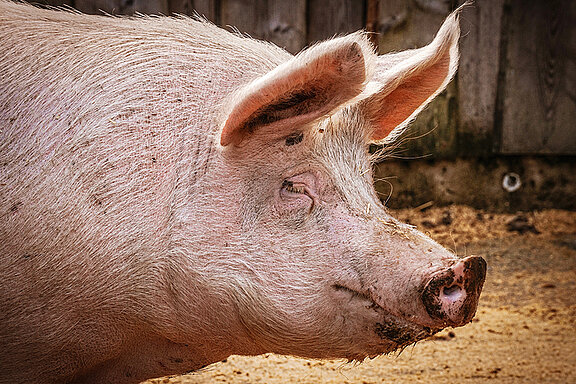The focus of this project to improve animal welfare at the slaughter of farm animals is the CO2 stunning of pigs. This stunning method causes less pre-slaughter stress on animals by driving them to the stunning facility in groups. However, when commonly used gas concentrations are applied, it leads to aversion, shortage of breath and escape reactions in the induction phase. This project will therefore investigate the use of alternative gases or gas mixtures for the stunning of slaughter pigs, which have a less aversive effect on the animal during the introduction phase and ensure that the animal remains unconscious and insensible until death by debleeding. In this field of research, several studies have already been carried out, some of which showed adverse effects of the application of alternative gases or gas mixtures on meat quality (especially hemorrhages when using argon and argon-nitrogen mixtures), but these effects are not fully understood. Broad studies on meat quality depending on the used gas are therefore intended to ensure a comparable product quality as possible. This meets the expectations of consumers for an animal-friendly treatment of livestock as well as for high-quality products. By using a newly developed gas technique, the gases and gas mixtures to be investigated can be applied in currently common gas stunning facilities using the dip-lift and paternoster systems, eliminating the need for an investment-intensive new construction of plants for the application of these gases. Due to the limited scope of the retrofitting of existing stunning facilities, a timely and economic implementation of the new gas stunning methods into practice after the end of the project seems to be feasible and an accelerated transfer of knowledge from research into practice can be achieved.
Study on the improvement of pigs´welfare during gas stunning in conventional paternoster and dip-lift systems by using alternative gases and gas mixtures
Research field animal welfare-friendly stunning and killing

Hausschwein (© pixabay)
Project partner:
The project is coordinated by the Friedrich-Loeffler-Institut and conducted together with the University of Göttingen, the Vion Perleberg GmbH and the gases and technology supplier Air Liquide Deutschland GmbH.
Funders:
The project is funded by the German Federal Ministry of Food and Agriculture by decision of the German Bundestag and is financially supported with additional funds from Verband der Fleischwirtschaft e.V., from QS Science Funds of the QS Qualität und Sicherheit GmbH and from Förderergesellschaft für Fleischforschung e.V.
Links
Press Releases: https://www.fli.de/de/presse/pressemitteilungen/presse-einzelansicht/mehr-tierschutz-am-schlachthof/ (in german language)

